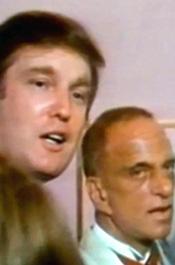Blaze Destroyed Trump Testimony For Roy Cohn
Lawyer's disbarment records lost in 2015 fire
MAY 17--A singular piece of Donald Trump history went up in flames last year during a warehouse fire on the Brooklyn waterfront.
The January 2015 blaze that gutted the CitiStorage facility in Williamsburg destroyed a massive collection of historical records stored there by the New York state court system.
Included in the tens of thousands of boxes of records incinerated were files relating to the disbarment proceeding brought against Roy Cohn, the reptilian attorney who gained fame at the shoulder of Senator Joseph McCarthy and eventually became a fixer and confidant for New York gangsters, politicians, and tycoons.
After a lengthy disciplinary hearing, Cohn was stripped of his law license in June 1986 for assorted “dishonesty, fraud, deceit and misrepresentation.” Among other transgressions, Cohn was found to have held the hand of a dying 84-year-old client as the senile man signed a document naming the attorney co-executor of his will. Cohn exacted the signature during an unannounced, late-night visit to the man’s Florida hospital room.
In a blistering decision, a court panel noted that, “For an attorney practicing nearly 40 years in this state, such misconduct is inexcusable, notwithstanding an impressive array of character witnesses who testified in mitigation.”
Along with Cohn pals like Barbara Walters, William F. Buckley, Jr., and New York Times columnist William  Safire, Trump appeared before the disciplinary panel and attested to the lawyer’s good character.
Safire, Trump appeared before the disciplinary panel and attested to the lawyer’s good character.
The voluminous Cohn disbarment records--which included the transcript of Trump's testimony--were destroyed in the Brooklyn fire, according to a court official who sought to requisition the files in response to a request from a TSG reporter.
Cohn, who was dying from AIDS at the time of his disbarment, dismissed disciplinary panel members as “a bunch of yo-yos.” He said that he felt sorry “for the people who have done this to me.” He then cited “certain rules of decency that you fight under, whether you’re fighting communists or anti-communists or people you just don’t like. I’ve been a tough fighter, but I hope I haven’t kicked people when they’re down.”
Cohn (seen above) represented Trump for more than a decade and became a principal figure in the developer’s life. In his biography of Trump, author Wayne Barrett wrote that Cohn assumed “a role in Donald’s life far transcending that of a lawyer. He became Donald’s mentor, his constant adviser on every significant aspect of his business and personal life.”
By Trump’s own account, he was drawn to Cohn’s vituperative, belligerent personality (aspects of which the presumptive Republican presidential candidate appears to have internalized). In press interviews, Trump noted that Cohn had been “vicious to others in his protection of me” and that the lawyer “was brutal, but he was a very loyal guy. He brutalized for you.”
In his book, Barrett quoted a Cohn aide’s recollection of a meeting between Trump and Genovese crime family boss Anthony “Fat Tony” Salerno that occurred inside Cohn’s Manhattan townhouse. The 1983 get-together came around the time that a concrete firm  controlled by Salerno was building a Trump condominium tower in Manhattan.
controlled by Salerno was building a Trump condominium tower in Manhattan.
Cohn’s East Side residence was a safe haven for hoodlums seeking to meet in private with their associates.
For example, in 1984 a top echelon FBI informant reported to his handlers that a Cleveland gangster under indictment hired Cohn so that he would have a reason to travel to New York, where he then met with Salerno in Cohn’s office to discuss the Genovese family’s control of the Teamsters union. FBI agents positioned outside Cohn’s East 68th Street home surveilled those meetings between Salerno (pictured at right) and Cleveland wiseguy Milton Rockman.
Cohn’s other residence, an estate in Greenwich, Connecticut, figured in a tax avoidance scheme in which Trump was once snared.
The billionaire was among dozens of wealthy customers of Bulgari, the Italian jeweler, who avoided paying sales tax on their purchases via the “empty box” scam. While customers walked out of Bulgari’s store in the Hotel Pierre with their baubles, employees would mail an empty box (or a package with a worthless trinket) to an address outside New York, allowing the buyer to dodge a state “use” tax.
Bulgari’s “empty box” ruse benefitted customers like Frank Sinatra, Henry Kissinger, Mary Tyler Moore, and Trump. As reported by The Village Voice in November 1986, Trump made at least two buys from Bulgari--a $50,000 necklace and a second purchase for $15,000. According to two former employees cited by the Voice, following the smaller purchase, an empty box was mailed to Trump at Cohn’s Connecticut home. Denying that Trump participated in the tax avoidance scheme, his spokesman told the Voice that the Bulgari purchases were “bona fide transactions.”
It does not appear that Trump was among the Bulgari customers who testified before a grand jury probing the “empty box” operation. The panel heard testimony from Leona Helmsley, court records show, while subpoenas were served on Kissinger’s assistant, television producer Mark Goodman, and other Bulgari patrons.
The jeweler and two of its executives subsequently pleaded guilty to helping customers dodge more than $1.5 million in combined sales tax. In announcing the pleas, Mayor Ed Koch said that he was disappointed that Bulgari customers were not also prosecuted on felony charges. “We should embarrass them,” Koch declared. “For a prominent person, even 15 days in jail is a prominent sentence.”
It is not hard to imagine that Koch specifically rued the fact that Trump--with whom he had frequently clashed and called “Greedy, greedy, greedy” and “Piggy, piggy, piggy”--never landed in the dock. (2 pages)






